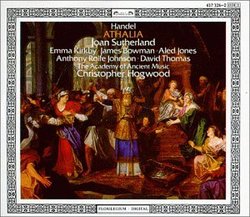DAUGHTER OF JEZEBEL
DAVID BRYSON | Glossop Derbyshire England | 03/27/2004
(5 out of 5 stars)
"This welcome reissue comes under the auspices of The Gramophone magazine, which had given it their choral award in 1987. The Gramophone was founded originally by Sir Compton Mackenzie (author of Whisky Galore) and has thrived throughout my lifetime as a reliable source of informed comment on and evaluation of classical music on record. I can't now remember, supposing I even knew, what other runners there may have been in that particular stakes, but there will not have been many better choral sets than this in most years.Athalia was written in 1733 and received its first performance in Oxford's Sheldonian theatre, where commemorative performances still take place. It is based on Racine's Athalie, the English adaptation having been given, regrettably, to Samuel Humphreys. Humphreys was by no means the equal of Morell or Jennens who collaborated with Handel on Theodora and on Saul and Samson respectively. He was a fourth-rate hack, representative of the lowest common denominator of 18th century English poetry, and his vocabulary and diction are as trite as can be. Nevertheless the strength and simplicity of Racine's basic plot is still sufficient to provide Handel with a good enough foundation for his oratorio. Athalia was a tyrannical queen, a worshipper of Baal who had established domination over the Jews, the daughter of Jezebel who visited her in a dream and gave her the premonition of her impending overthrow and death. There are only six characters in total, plus of course the chorus, and the most significant of these other than Athalia is the boy Joas, the true king of Judah.The casting of these two characters, who dominate the story although they do not have the largest share of the music, is what makes all the difference to a performance of Athalia. Joas is sung by the (then) boy treble prodigy Aled Jones, who now fronts a maudlin piece of Sunday evening religiosity known as Songs of Praise. For the evil queen someone had the inspired idea of inviting Joan Sutherland to take the part. She is a great Handelian of course, but an unfamiliar figure in Ancient Music circles. The role calls for a diva, someone with a big voice and a background in opera. Thus cast, the queen is admirably contrasted with the clear, bright voice of Emma Kirkby as Josabeth and the surprisingly strong treble tone of Aled Jones. The other parts are taken by the familiar cast of James Bowman, Anthony Rolfe Johnson and David Thomas with the choir of New College, Oxford, and the period-instrument ensemble is drawn from the Academy of Ancient Music under Hogwood. Here Hogwood does not, as he famously did in his epoch-marking Messiah, seem to be after speed records. The harpsichord continuo is fairly prominent, which I expect will not suit everyone, but it is done with predictable proficiency by Alistair Ross. Given the general assumptions behind it, the performance seems to me in every respect admirable. One does not encounter performances of Athalia at every turn, to say the least, and I feel little or no inclination to look for faults with this one. It is absolutely wonderful music and the performance is a delightful mixture of the proven and reliable with the innovative and imaginative. I have no complaints about the recording either and there is a very helpful liner note by Winton Dean."
What Was Somebody Thinking?
Giordano Bruno | Wherever I am, I am. | 03/14/2010
(3 out of 5 stars)
"Athalia is an underappreciated masterwork, one of Handel's most dramatic, operatic oratorios. I think it would be worth considering a staged performance; the idea has worked with other Handel oratorios.
Queen Athalia is a Baal-worshipper, daughter of the notorious Jezebel. Her chief general, Abner, is secretly a supporter of a return to the worship of Yahweh, under a legitimate king. The boy Joas, the real heir to the throne, has been raised in secret. The truth will come out and Athalia will howl in rage. The role of Athalia calls for a fiery singer, but the casting of Joan Sutherland as Athalia was nothing short of idiocy. Sutherland lacked any semblance of baroque vocal technique. She scooped notes, lagged on passages that require agility, relied on an indecorous vibrato to cover vague tuning, and besides, her voice was heavy and musky, a quality shockingly contrasted with the elegant clarity of Emma Kirkby, singing the role of Josabeth, the woman who protected the boy Joas.
This is a recording from 1986. The two countertenors, Aled Jones and James Bowman, were no doubt quite highly regarded at the time, particularly Bowman, but they both sound rather undeveloped technically to ears accustomed to singers like Philippe Jaroussky and Andreas Scholl.
The orchestra of The Academy of Ancient Music, on the other hand, was quite proficient on their historic instruments, and Christopher Hogwood was a more outstanding conductor than most of us "veterans" realized at the time. Either that, or his recordings, like vintage wines, have improved by being cellared."

